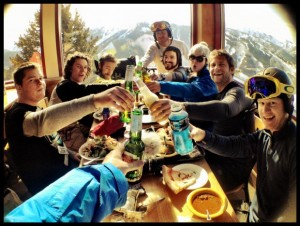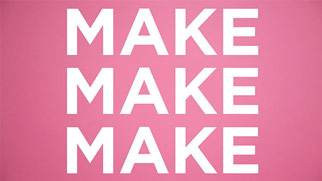 Hello, readers! Megan here, Producer at Chase Jarvis Inc. We’ve just returned from an amazing 6-day shoot in Aspen, CO. You perhaps read about it here, here, or here. It got me thinking about client/crew relationships and customer service.
Hello, readers! Megan here, Producer at Chase Jarvis Inc. We’ve just returned from an amazing 6-day shoot in Aspen, CO. You perhaps read about it here, here, or here. It got me thinking about client/crew relationships and customer service.
One of the ways you can set yourself apart as a creative professional is to really go the extra mile for both your client(s) and your crew. This applies to YOU, whether you’re a photographer or director producing your own jobs with a small crew, or a producer wrangling a hefty crew with a lot of moving parts. Here are some things to think about before your next shoot:
1. Flights: We do a lot of traveling around here, and we all know that flying can be a pain in the you-know-what. Lines, waiting, more lines, more waiting. Knowing whether people prefer a window or aisle, bulkhead or exit row, goes a long way to make the experience that much better. Be sure to include frequent flier numbers, when applicable. Also, how is everyone getting to the airport? Can you arrange for a car service to carpool some folks that live close to one another? Or should everyone cab it individually and bill the cost along with their final invoice?
2. Hotels: Whether you’re staying in a 3, 4, or 5-star hotel with tons of amenities, or a low-budget motel off the highway, providing the front desk with some details about your stay can really help things run smoothly. Be sure to let them know how many of you are traveling together and if you have any special needs (early check-in, late check-out, meeting space for your pre-pro, printing capabilities, wi-fi access, breakfast, gear storage, etc.). Ask for dining recommendations or the location of the nearest grocery or drug store. Additionally, since you’re perhaps spending a serious chunk of change with the hotel, you might be able to wiggle into a few extra benefits as well that could help your shoot – early breakfast, discount rates, or extra rooms for gear/meetings. Also remember: the front desk is there to help, if you let them. You can show your appreciation by generously tipping the staff, the shuttle driver, bell hop, housekeeping, etc. Upon checkout, we like to leave an envelope at the front desk for housekeeping. Generally, the rule of thumb is $2 to $5 per day per room.
3. Rental cars: Think about what kind of space you need: you may be traveling with so much gear that an SUV is a necessity or maybe even a cargo van. Or maybe your client wants a convertible if you’re shooting somewhere warm and tropical. Which company should you use? There’s a balance to be found between price, convenience and reliability. We are usually hurrying off to a pre-pro or a scout and need to know that our car is ready and right. Whenever possible, we go with a company with whom we have a preferred account for fast service and a location in the main terminal.
4. Food: I could go on forever about this one. Food is often an undervalued aspect of a shoot. Keeping your crew well-fed and watered can go a long way to making a tough day feel less tiresome.
- Know food allergies and/or preferences. Is anyone allergic to nuts, gluten-free or vegetarian?
- Snacks are an easy way to make people happy. Our crew likes Peanut M&Ms, red Swedish Fish, beef jerky and string cheese. What does your crew like to have handy?
- What kind of restaurants does your client like to eat at for dinner? Sushi? Mexican? Find out so you can make a reservation in advance. We always love a spot with a private room for large parties. In many restaurants, there’s not even an extra charge!
5. Community: Make sure you get to know your clients and crew well; nothing brings a crew together like an off-duty meal. It’s a fantastic opportunity to talk about things other than the j-o-b and really get to know everyone on a personal level. Your client’s wedding anniversary is next month? File that tidbit away so you can be sure to send him or her a card and perhaps a bottle of wine.
6. Follow-through: Make sure everyone has received and read the call sheet you emailed by following up with a phone call to confirm. It sucks when a key member of your team calls bright and early on shoot day frantic because they don’t know where to go and when.
7. Organization: If there’s one skill that every producer should have honed, it’s organization. It can be tricky to keep track of all the moving pieces, but if you have a good system in place, it can help out tremendously. Try centralizing your information into a production book, with the creative, contact info, schedule, shot list, talent, locations, permits, calendar, travel confirmations, etc. that you can constantly reference. Not only is it super helpful for you, but it instills confidence in your client that you know what you’re doing and that you have everything under control.
8. Details: You know what they say, the devil is in the details. It’s often the little things that make the difference between an okay shoot and an awesome one. Is there a concierge we can leave our skis + snowboards with at the hotel? Is there a hotel shuttle available to take us to the location? Did you remember to get that radio to the 1st assistant? Or make sure everyone has their lift tickets on them? There are a million of these little details to think about on any shoot. The more you can anticipate in advance, the smoother your shoot will go. And the more you’ll impress your clients.
9. Communication: Words to live by, friends, “over-communicate.” Make sure everyone is on the same page and knows what the expectations are. Just had a conference call with your client? Summarize what transpired and who’s responsible for what in an email. I promise you, this will save your behind at one point or another during your career. This is also an effective way to make sure nothing slips through the cracks.
10. Be (sincerely) nice: This might seem like a no-brainer, but I can’t tell you how many times I’ve gotten myself out of a jam by simply being really nice. I’m not suggesting that you overdo it on the saccharine; in fact, no one likes a kiss-ass. This can sometimes be easier said than done, but don’t forget that we’re lucky to be doing what we love for a living. You’ll find that people (both clients + crew) are a lot more eager to work with you on a long-term basis if you just be nice 🙂
Thanks for reading! For more production tips, be sure to check out Kate’s awesome post here.












Love this post, Megan! Such a good reminder that the “little” things really do add up to make a big difference in everyone’s experience (positive or negative).
It all comes down to one excellent sentence: “don’t forget that we’re lucky to be doing what we love for a living.”
Let your crew/clients enjoy the “work” as much as you do and every thing falls in to place.
Grate post.
J.
well know secret in the hotel industry is that if you ask someone to give your money to another person as a gratuity it probably
Very nice post Megan! I picked up a lot of helpful tips and I’ll make sure to memorize them well.
Daniel